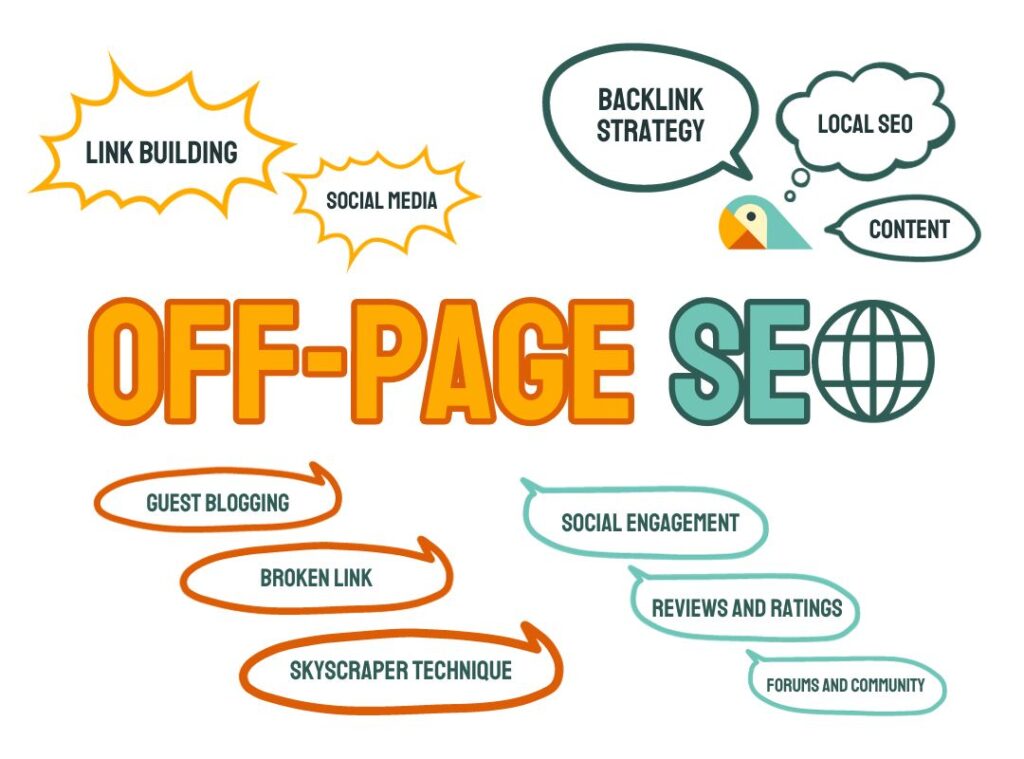Search engine optimization (SEO) is not just about what happens on your site. It’s also about the decisions and actions taken outside of your website.
This is known as off-page SEO, and in this exploration, we’re going to look at the key elements that define off-page SEO, why it matters, and how you can harness it to enhance your online presence.
The Core of Off-Page SEO
Off-page SEO is a crucial factor for search engines when they decide how to rank web pages. Think of it as a popularity contest. The more votes or links your website receives from others, the more search engines consider your content to be valuable, credible, and authoritative.
Off-page SEO tells search engines what others think about your site. If you have high-quality backlinks pointing to your pages, search engines infer that your content must be valuable and worth a higher ranking.
The Link Building Foundation
Link building is the backbone of off-page SEO. Each link to your website is like a vote in your favor, but not all votes are equal.
Links from authoritative and relevant websites carry more weight. It’s about quality as much as quantity. Getting a handful of links from trusted sites can be more powerful than getting dozens from lesser-known corners of the internet.
Social Media and Off-Page SEO
Social media doesn’t directly contribute to SEO rankings, but the links you share across social platforms increase brand exposure. They add up and influence SEO in indirect ways.
High-quality content often gets shared more on social media, which can lead to an increase in brand searches and more traffic—signals that search engines pay attention to. Plus, social profiles themselves often rank in search results, increasing your online visibility.
Building Authority with Backlinks
A good backlink carries authority and comes from a site that’s both credible and relevant to your niche. The context of the link is also crucial; it should appear naturally within content that complements the linked page.
Search engines also evaluate the anchor text used for the link, as it gives them clues about the content’s relevance and value.
The Anatomy of Backlink Strategies
- Guest Blogging: Writing posts for other blogs can earn you valuable backlinks.
- Broken Link Building: Finding broken links on other sites and suggesting your content as a replacement can be an effective method.
- Skyscraper Technique: Improving existing content from other sites and asking those who linked to the original to link to your superior version.
Each strategy requires its own approach, but the goal remains the same: secure backlinks that boost your site’s authority and search rankings.
Tracking and Managing Your Backlink Profile
Your backlink profile is the sum total of all the links pointing to your site. It’s vital to track and manage this profile to keep your site’s reputation in good standing.
Tools like Ahrefs, SEMrush, or Moz can help you monitor your backlinks, assess their quality, and identify potentially harmful links that could attract penalties from search engines.
Social Signals and Their Impact
Social signals refer to the collective shares, likes, and overall visibility of your website content on social media platforms.
While these signals are not direct ranking factors, they can lead to behaviors that are beneficial for SEO. For example, a viral post may lead to increased brand recognition, more search queries, and additional backlinks from websites referencing your content.
Maximizing Social Engagement
Maximizing social engagement involves creating shareable content and being active on social platforms. Use tools like BuzzSumo to understand what content works well in your industry.
Engage with your audience, respond to comments, and participate in conversations. This can lead to more shares, higher content visibility, and, ultimately, more traffic to your website.
Leveraging Trust Through Reviews and Ratings
Reviews and ratings on third-party platforms can significantly influence your website’s perceived credibility and trustworthiness.
Positive reviews can sway potential customers and send signals to search engines that your site or business is authoritative and respected. Encouraging satisfied customers to leave reviews on platforms like Google My Business can have a positive impact on your SEO.
Managing Your Online Reputation
Managing your online reputation is non-negotiable. Respond to reviews, both positive and negative, in a professional manner.
This not only shows good customer service but also indicates to search engines that you value feedback and engage with your audience. Use tools like Google Alerts to keep track of mentions and stay on top of your reputation management.
The Power of Content Marketing in Off-Page SEO
Content marketing is not just about creating content for your site. It’s about creating content that other sites want to link to.
This means investing in original research, detailed guides, insightful commentary, and content that addresses user queries comprehensively. The more value you provide, the more likely others are to cite and link to your content.
Strategies for Distributing Your Content
Once you have great content, you need to get it in front of the right people. Sharing it on social media, reaching out to influencers in your field, and sending out newsletters are all effective strategies. The key is to put your content where it will be seen by those who will find it valuable and are likely to share or link to it.
Measuring the Impact of Your Content Marketing
To gauge the success of your content marketing efforts, track metrics like the number of backlinks earned, the quality of those backlinks, social shares, and how much traffic your content is driving to your site.
Tools like Google Analytics and Ahrefs can provide these insights, helping you refine your strategy and create more impactful content.
The Significance of Forums and Community Sites
Participating in forums and community sites related to your industry can help you build authority and drive traffic to your website.
By providing helpful answers and genuine advice, you can establish yourself as an industry expert. Always include a signature with a link back to your site when appropriate, but avoid outright self-promotion, as this can backfire.
The Dos and Don’ts of Forum Engagement
Do be helpful, courteous, and informative in your forum interactions. Don’t spam or only post for the sake of backlinks.
Your primary goal should be to contribute to the community meaningfully. This approach will naturally lead to more recognition and potential traffic to your site, enhancing your off-page SEO efforts.
The Influence of Local SEO in Off-Page Optimization
For local businesses, having a presence on local listings and directories is a must. Sites like Yelp, TripAdvisor, and Google My Business play a significant role in off-page SEO by providing trustworthy signals to search engines.
Ensure your business information is accurate, consistent, and updated across all platforms to maximize your local SEO.
Capitalizing on Local Community Engagement
Engaging with your local community can have a big impact on off-page SEO. Sponsor local events, join local business groups, and be active in community initiatives.
These activities often result in mentions and links on local websites and social media pages, boosting your local SEO profile.
FAQs
Can off-page SEO efforts improve the speed at which my website ranks on search engines?
Absolutely. Off-page SEO can accelerate your ranking speed by building credibility and authority through external sources. For instance, high-quality backlinks from authoritative sites can signal to search engines that your content is valuable, prompting a quicker adjustment in your rankings.
However, the time frame can vary widely based on competition, industry, and the current standing of your website.
How do I know if my off-page SEO strategies align with Google’s guidelines?
The best way to ensure your off-page SEO strategies align with Google’s guidelines is to focus on creating genuine, high-quality content and connections.
Avoid schemes that artificially inflate your backlink profile, such as purchasing links or participating in link farms. Regularly check Google’s Webmaster Guidelines for updates on best practices.
Are nofollow links of any value in off-page SEO?
Yes, nofollow links have value, even though they don’t pass on link equity. They can drive traffic, increase visibility, and contribute to your site’s natural link profile, which is an important aspect of a healthy SEO strategy. A natural link profile includes a mix of dofollow and nofollow links.
Is there a risk of getting penalized for my off-page SEO actions?
Penalties can occur if you engage in practices that violate search engine guidelines, such as purchasing backlinks or participating in link exchange schemes. Always aim for organic growth and avoid these black-hat SEO tactics to minimize the risk of penalties.
How often should I conduct a backlink audit for my website?
It’s a good practice to conduct a backlink audit quarterly. This routine allows you to identify and address potentially harmful links, track the growth of your backlink profile, and refine your strategies for link acquisition.
Can off-page SEO be effective for a new website with little to no existing online presence?
Yes, off-page SEO can be particularly effective for new websites. Establishing a presence on social media, getting listed in directories, and starting to build relationships with other webmasters for potential backlink opportunities can lay a strong foundation for your new website’s search engine performance.
Closing Thoughts
Off-page SEO may seem like an external factor beyond your control, but it’s an integral part of your overall digital strategy. It requires consistent effort and attention to detail.
Focus on building high-quality backlinks, leveraging social media effectively, managing your reputation, and engaging with your community both online and locally.
By doing so, you can significantly improve your website’s authority, rankings, and visibility in search engine results. Remember, off-page SEO is about building relationships and a reputation that search engines and users alike will trust.






